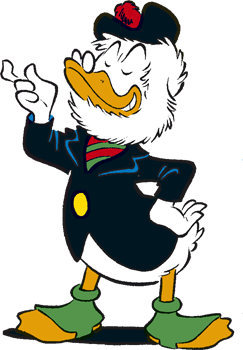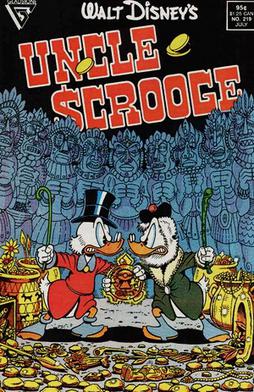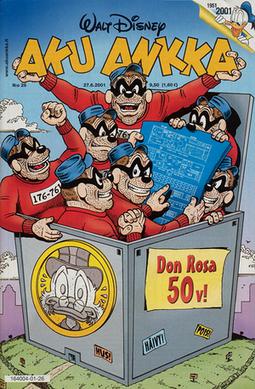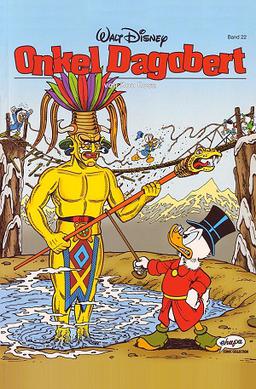Plot
Scrooge McDuck has bought land in India's Punjab region, and arrives on the scene together with Donald and his nephews to inspect what he has bought. He meets with the local maharaja to seek his help in enlisting a work force, but the maharaja openly admits to being thoroughly corrupt, diverting the millions of dollars in foreign aid sent to his province; he declines to help, since it is his people's abject poverty that keeps that aid flowing into his coffers.
Left on their own, the Ducks begin their quest, when they accidentally discover a stone pillar, dating back to 326 BC, and tells the tale of Alexander the Great's attempt to conquer Punjab. However, the conquest failed, with Alexander's men fleeing India in utter terror. The tale also tells that Alexander was seeking Shambala, an ancient Indian city containing untold riches. When Scrooge hears of this, he sets out to find the city for himself. The maharaja overhears this and follows the Ducks in secret.
The Ducks eventually find Shambala in ruins, but the city is still booby-trapped with mortal dangers. Near the main temple they find some sort of control panel with ten buttons, each based on one of the ten avatars of Vishnu. The boys stay at the control panel while Scrooge and Donald venture deeper, maintaining radio contact with the boys.
All sorts of Indiana Jones-like trap situations occur when Scrooge and Donald progress on their way, with the boys saving them every time by telling them what to do and pressing the right button at the right time. Scrooge and Donald eventually find the treasure, but it's protected with one last booby-trap. The boys are about to clear this trap too, but the maharaja has caught up with them, and prevents the boys from pushing the button, causing the treasure to be flushed into a nearby river. The maharaja pushes another button, which sets off Shambala's self-destruct mechanism. The Ducks and the maharaja flee the city post-haste.
When arriving back in the maharaja's village, the Ducks find that the river has carried the treasure there, but the villagers have already shared it among themselves, finally having enough money to abandon the village and start new lives elsewhere. Scrooge, taking the loss of the treasure philosophically, offers to discuss employing the villagers in his future enterprises in India, and they are happy to agree.
The Maharaja is left in despair. With no treasure and now the ruler of an empty village, he has no remaining pretext to collect "aid" from unsuspecting foreign nations. As the Ducks depart, Scrooge cheerfully reminds him that he still has an unlimited supply of one legacy from his ancestors: the number zero.

Carl Barks was an American cartoonist, author, and painter. He is best known for his work in Disney comic books, as the writer and artist of the first Donald Duck stories and as the creator of Scrooge McDuck. He worked anonymously until late in his career; fans dubbed him The Duck Man and The Good Duck Artist. In 1987, Barks was one of the three inaugural inductees of the Will Eisner Comic Book Hall of Fame.

Huey, Dewey, and Louie are triplet cartoon characters created by storyboard artist (screenwriter) Carl Barks for The Walt Disney Company from an idea proposed by cartoonist Al Taliaferro. They are the nephews of Donald Duck and the grand-nephews of Scrooge McDuck. Like their maternal uncles, the brothers are anthropomorphic white ducks with yellow-orange bills and feet. The boys are sometimes distinguished by the color of their shirts and baseball caps. They appeared in many Donald Duck animated shorts, as well as in the television show DuckTales and its reboot, but the comics remain their primary medium.

Scrooge McDuck is a cartoon character created in 1947 for The Walt Disney Company by Carl Barks. Appearing in Disney comics, Scrooge is a Scottish-born American anthropomorphic Pekin duck. Like his nephew, Donald Duck, he has a yellow-orange bill, legs, and feet. He typically wears a red or blue frock coat, top hat, pince-nez glasses, and spats varying in color. He is portrayed in animation as speaking with a Scottish accent. Originally intended to be used only once, Scrooge became one of the most popular characters in the Disney comics world, as well as Barks' signature work. Scrooge is an extremely rich duck who lives in the fictional city of Duckburg in the fictional U.S. state of Calisota, whose claimed location is in real-world California, United States.

The Clan McDuck is a fictional Scottish clan of cartoon ducks from which Disney character Scrooge McDuck is descended. Within the Donald Duck universe, the clan is related to the American Duck family through the marriage of Hortense McDuck and Quackmore Duck, Donald and Della Duck's parents, giving both of them partial Scottish ancestry.

Flintheart Glomgold is a cartoon character created in 1956 by Carl Barks. He is a South African American Pekin Duck and the business rival of Scrooge McDuck, usually portrayed as an ambitious, ruthless, and manipulative businessman who shares many of the same qualities as Scrooge—the drive for massive wealth, and the cunning and creativity to obtain the same—but he lacks any of Scrooge's tendencies towards generosity and compassion. In Don Rosa's The Life and Times of Scrooge McDuck, he is said to be a Boer.

The Donald Duck universe is a fictional shared universe which is the setting of stories involving Disney cartoon character Donald Duck, as well as Daisy Duck, Huey, Dewey, and Louie, Scrooge McDuck, and many other characters. Life in the Donald Duck universe centers on the city of Duckburg and is a part of the larger Mickey Mouse universe. In addition to the original comic book stories by Carl Barks, the Duckburg cast was featured in Little Golden Books, television series such as DuckTales (1987–1991), Darkwing Duck (1991–1992), and the DuckTales reboot (2017–2021), and video games such as DuckTales (1989), QuackShot (1991), Goin' Quackers (2000), and DuckTales: Remastered (2013).
Uncle Scrooge Adventures is a 1987–1997 Disney comic book series published by Gladstone Publishing under license from the Walt Disney Company. It features the adventures of Scrooge McDuck and his nephews Donald, Huey, Dewey, and Louie. It was usually distinguished from the main Uncle Scrooge title in its focus on longer, full-length stories, often in the pulp adventure style.

"Guardians of the Lost Library" is a 1993 comic book story made by Don Rosa for The Walt Disney Company, mentioned by Comics Buyer's Guide as "possibly the greatest comic book story of all time". Although afraid at the time of its creation of cramming too many historical details into the story, Rosa himself mentions in Uncle Scrooge #383 that in fan mail he receives to this day, "Guardians of the Lost Library" to his own surprise is often referred to as "'the best Rosa story' or 'the best Duck story' or even 'the best comic book story' (?!!) that fans say they've ever read."
In Tibetan Buddhist tradition, Shambhala, also spelled Shambala or Shamballa, is a spiritual kingdom. Shambhala is mentioned in the Kalachakra Tantra. The Bon scriptures speak of a closely related land called Tagzig Olmo Lung Ring.

"The Son of the Sun" is the first Scrooge McDuck comic by Don Rosa, first published in Uncle Scrooge #219 in July 1987. It is a well-known comic book story that features Disney's Scrooge McDuck, Donald Duck, and his three nephews. This story is most notable for establishing Don Rosa as a major talent in the Disney comic book industry, as well as fulfilling Rosa's childhood dream of becoming a writer/illustrator of stories featuring Scrooge McDuck.

"A Little Something Special" is a 1997 Disney comics story created by Don Rosa to celebrate the 50th anniversary of Scrooge McDuck's first appearance in Carl Barks's "Christmas on Bear Mountain" in 1947.
David Gerstein is an American comics author and editor as well as an animation historian. Gerstein has five books and countless comic book credits to his name. He has written many Disney comics stories, usually featuring Mickey Mouse and/or Donald Duck and provided American English script doctoring for Mickey and Donald stories that were originally written in a different language. Past employments include Egmont Creative A/S, a Danish comics studio, and Gemstone Publishing. His current work is with various affiliates of Egmont, and Fantagraphics Books.

"The Empire-Builder from Calisota" or "The Richest Duck in the World" is a 1994 Scrooge McDuck comic by Don Rosa. It is the eleventh of the original 12 chapters in the series The Life and Times of Scrooge McDuck. The story takes place from 1909 to 1930 and details Scrooge finishing his quest to become the richest man in the world, during which he becomes hardened and overall hostile towards others.

"The Beagle Boys vs. the Money Bin" is a 2001 Donald Duck comic by Don Rosa. Rosa's inspiration for it was mostly to get a chance to thoroughly demonstrate the Money Bin, invented by Carl Barks.
"The Dutchman's Secret" is a 1999 Donald Duck comic story by Don Rosa. It is a direct sequel to his 1998 story The Vigilante of Pizen Bluff and is one of his most historically accurate stories.

"The Last Lord of Eldorado" is a 1998 Donald Duck comic story by Don Rosa.
"Treasure under Glass" is a 1991 Uncle Scrooge comic story by Don Rosa.
"The Secret of Atlantis" is a 32-page Disney comics story written and drawn by Carl Barks, and lettered by his wife, Garé Barks.












